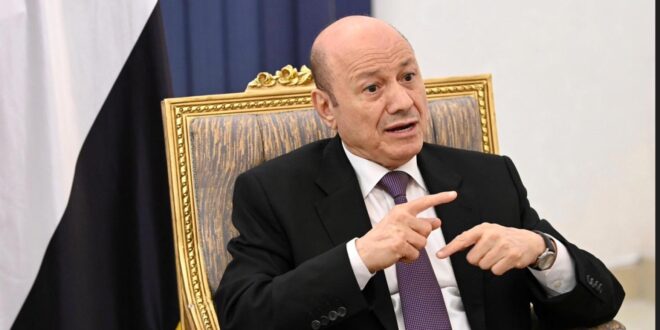ADEN – SABA
His Excellency President Dr. Rashad Mohammed al-Alimi, the Chairman of the Presidential Leadership Council, emphasized that the support of the Yemeni government to restore state authority and impose its control over the entire national territory is the only and decisive way to secure the Red Sea and the Bab al-Mandab Strait.
In an interview with Asharq Al-Awsat newspaper, President al-Alimi downplayed the ability of limited US and British airstrikes to end the threat of the Houthi terrorist militias and their attacks on commercial and oil vessels and international shipping lines.
He pointed out that the US and UK strikes on Houthi bases would weaken the Iranian-backed militia, but the ultimate solution would not be airstrikes alone.
He clarified that the threat comes from the land, which is under the control of the militias, and to confront it, it is necessary to restore state authority and impose its control over all regions with the support of the international community.
“This is the only way to secure the Red Sea,” he stressed.
He indicated that the West has always exerted pressure on the legitimate government to accept political approaches to a settlement, which helped the Houthis to continue.
“It seems that the West has now changed its view of the crisis and adopted a military approach after the political approach failed,” he said.
The Chairman of the Presidential Council also pointed out that the Houthi terrorist militias exploited the war in Gaza to confuse the situation and evade their international and UN commitments under the pretext of “supporting Gaza,” while at the same time, these militias besiege the city of Taiz.
He addressed the Houthis, saying: “escaping will not benefit, lift the siege on the Yemeni people first.”
The President mentioned that Yemen has been affected by the war in Gaza and that the Houthi attacks on ships have militarized the Red Sea, and broad alliances have been formed to counter these attacks, which have led to a decline in the Yemeni citizens’ livelihoods and an increase in prices, coinciding with a six-fold increase in shipping costs.
He emphasized that these attacks do not serve Gaza but rather serve Iran, which seeks to negotiate with the United States regarding sanctions and unleash its hand as a regional player in the area.
He held Iran responsible for the crises in the region, stating that Iran-affiliated militias in Yemen, Syria, and other countries prioritize Iran’s interests over everyone else’s.
He mentioned that Iran had early plans to control the Red Sea and he had previously warned about it in his speech before the United Nations General Assembly in September 2022.
He considered the establishment of an independent Palestinian state within the framework of a solution based on the Arab Peace Initiative as the only way to end the conflict, away from complicating matters.
In this context, he stated that there are two projects in the region: One is a developmental and renaissance project led by Saudi Arabia, Egypt, and the United Arab Emirates, and the other is a destructive and chaotic project executed by armed militias, noting that one facet of this conflict has resulted in the displacement of about 5 million people inside and outside of Yemen.
President al-Alimi expressed his appreciation for Saudi Arabia’s efforts to achieve peace in Yemen, saying: “the Kingdom has accumulated experience and expertise that we rely on, along with its vision for the benefit of Yemen and Yemenis.”
He explained that Saudi Arabia has made significant efforts to achieve peace in Yemen over the past two years and even before that, leading to “a roadmap that can serve as a basis for the peace process.”
“The Kingdom discussed several points with the group and the government, and after debates and negotiations, they reached an agreement that forms a basis that can be built upon for the peace process,” he said.
He reiterated the government’s commitment to the path of peace and the efforts made by the Presidential Council over the past two years, stating: “We declared it explicitly after the formation of the Council that it is a council for peace, not for war, and we praised the Saudi efforts because peace is in the interest of Yemen, the region, and the international community.”
He expressed his hope that the Saudi roadmap would push towards a comprehensive peace process, based on the Gulf Initiative, the outcomes of the National Dialogue Conference, and the international legitimacy decisions represented by UN Security Council Resolution 2216, which was recently reaffirmed through another resolution condemning the Houthi group’s attacks on ships passing through the Red Sea.
He reaffirmed his belief that peace is the solution to the ongoing conflict in the country.
“Peace is in Yemen’s interest, but on the condition that the state regains its institutions, monopolizes weapons, and implements the Security Council resolution,” he said.
Security Council resolutions provide a roadmap that includes a political, military, and security solution to the Yemeni issue, and if the international community implements them, peace will be achieved, he added.
Regarding the Houthi announcement of minting a metal currency of 100 Yemeni riyals, he affirmed that “this currency is illegitimate and the Central Bank in Aden has taken several measures to address it, with the support of the government.
The Chairman of the Presidential Council expressed his determination to “confront this action by the Houthis,” noting that the IMF and the World Bank are in contact with the internationally-recognized government, and there will be meetings to discuss the measures that the international community will take to support the Central Bank in Aden.
 Ministry of Foreign Affairs and Expatriates Official Web Site
Ministry of Foreign Affairs and Expatriates Official Web Site
